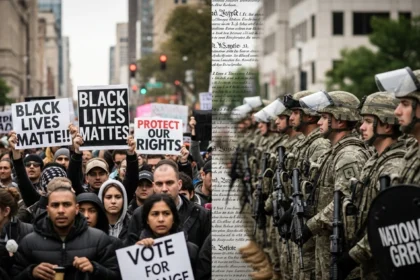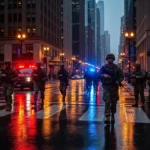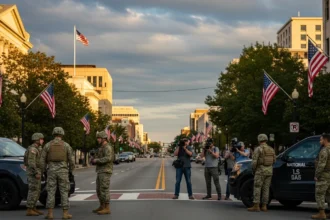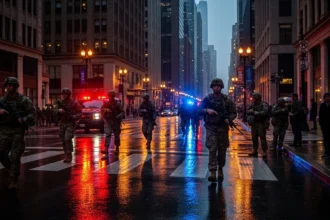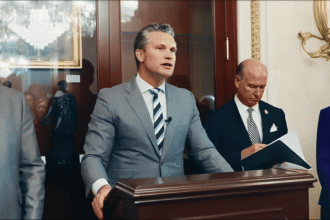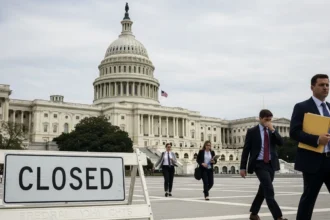Former President Donald Trump has ignited a political and legal firestorm by threatening to invoke the Insurrection Act — a rarely used 19th-century law that allows presidents to deploy federal troops within the United States. His remarks came amid ongoing unrest and rising tensions between federal and state authorities over crime, protests, and border-related demonstrations in several major cities, including Chicago, Portland, and Los Angeles.
Trump’s comments have triggered swift backlash from state governors, civil rights groups, and legal scholars, all warning that such a move could spark a constitutional showdown over the limits of presidential power.
What Trump Said
Speaking during a press event earlier this week, Trump stated that he was “seriously considering” invoking the Insurrection Act if “Democrat-run cities continue to fail in maintaining law and order.”
He emphasized that “the federal government can’t stand by while chaos spreads,” framing his stance as a necessary step to restore public safety. “We have an Insurrection Act for a reason,” he added, suggesting that if local leaders won’t control unrest, he will “take care of it directly.”
The comment, while brief, was enough to set off a wave of political reactions and legal scrutiny across the country.
Understanding the Insurrection Act
The Insurrection Act of 1807 is one of the most powerful and controversial tools available to a U.S. president. It permits the deployment of military forces on American soil in cases of rebellion, domestic violence, or when local authorities are unable or unwilling to enforce federal law.
It has only been used sparingly in modern history — most notably during the 1992 Los Angeles riots and, before that, in the 1960s during civil rights confrontations.
Legal experts point out that while the president technically has broad discretion to determine when to invoke the law, doing so without clear necessity risks serious political and constitutional consequences.
Timeline of Escalation
Over the past several weeks, tensions between state and federal authorities have been mounting.
- Late September 2025: National Guard troops in Texas were ordered to assist with border security, drawing protests from neighboring states.
- Early October: Reports surfaced of federal preparations to move troops into Chicago, citing “escalating unrest.”
- October 6–7: Illinois and the city of Chicago filed emergency lawsuits seeking to block the move, arguing it was unconstitutional federal overreach.
As of now, courts are weighing emergency motions to stop any troop deployment pending full hearings, with rulings expected within days.
Legal Pushback and Constitutional Debate
The threat to use the Insurrection Act has unleashed an intense debate among constitutional scholars.
Supporters of Trump’s move argue that he is within his rights to act when state governments “fail to maintain public order.” They contend that the president’s foremost duty is to protect citizens and federal property.
Critics, however, call the move a dangerous power grab. They say using the military to police American cities undermines the Posse Comitatus Act, a foundational law that limits the use of the armed forces in domestic law enforcement.
Civil liberties groups warn that such action could blur the line between military and civilian authority — a principle that has safeguarded American democracy for generations.
Political Fallout
Governors and mayors from several states have fiercely condemned the proposal. Illinois Governor J.B. Pritzker called it “an unconstitutional and reckless threat,” while Oregon’s governor vowed to “fight any federal incursion with every legal tool available.”
In contrast, several Republican lawmakers have voiced support for the move, echoing Trump’s claims that Democratic city governments are “soft on crime.”
The Pentagon, meanwhile, has remained largely silent. Sources within the Department of Defense have reportedly expressed concern over being drawn into a politically charged domestic operation, fearing it could damage the military’s apolitical image.
Historical Context: When It’s Been Used Before
Invoking the Insurrection Act has always been a moment of national crisis. In 1957, President Dwight D. Eisenhower used it to enforce school desegregation in Little Rock, Arkansas. In 1968, Lyndon B. Johnson relied on it during riots following Martin Luther King Jr.’s assassination.
But in those cases, federal troops were deployed to uphold constitutional rights — not to override local leaders or enforce broad “law and order” measures. That distinction is why many experts see Trump’s proposed use as fundamentally different — and far more controversial.
Possible Outcomes
Legal experts suggest several scenarios could unfold:
- Court Injunction: Federal judges could issue temporary restraining orders preventing troop deployment.
- Limited Approval: Courts might allow limited use of troops to protect federal facilities but not engage in local policing.
- Full Invocation: If courts defer to executive discretion, Trump could gain broad authority to act — setting a powerful precedent for future presidents.
Either way, the legal battle could move swiftly through appeals, possibly reaching the Supreme Court if the situation escalates further.
Potential Risks and Consequences
Deploying troops domestically could have profound implications. Beyond civil liberties, it could inflame already polarized political divisions, erode trust in institutions, and normalize military involvement in domestic affairs.
There’s also a practical concern: soldiers are trained for combat, not community policing. Past deployments under the Insurrection Act have shown that even limited use of troops can heighten tensions rather than calm them.
The Road Ahead
As lawsuits pile up and both sides dig in, America faces one of the most significant tests of federal power in decades. Trump’s threat to invoke the Insurrection Act may remain a political weapon — or it could soon trigger a real-world constitutional crisis.
Much now depends on the courts, the Pentagon’s willingness to comply, and whether public pressure forces a political retreat.
Conclusion
Trump’s suggestion that he might send troops into American cities is more than political theater — it’s a flashpoint in a long-running debate over the balance between federal authority and state sovereignty.
If the Insurrection Act is invoked, it would represent one of the most dramatic uses of presidential power in modern U.S. history — with consequences likely to reverberate for years to come.
The nation now watches closely to see whether the line between political posturing and military mobilization will finally blur.

